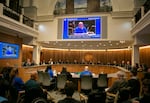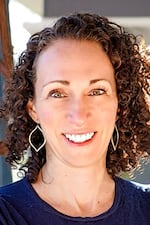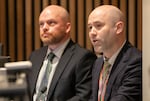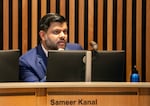
From left, Mayor Keith Wilson, City Administrator Michael Jordan, and all twelve members of Portland's City Council listen to testimony from City of Portland Professional Workers Union members, Feb. 5, 2025, Portland, Ore.
Anna Lueck for OPB
Portland’s recent government overhaul was driven, in part, by a desire to increase public involvement in city decisions. But, three months into a new government structure, city leaders still haven’t figured out how to strike a balance between public input and passing policy at City Hall.
“Before I make my vote, I want to hear the public testimony,” Councilor Candace Avalos said at a March 19 council meeting, where councilors considered barring public testimony on a resolution related to Zenith Energy due to time constraints. “This is a really critical process that we need to maintain.” Councilors eventually voted on the Zenith measure, but not until after a lengthy debate on the public feedback process.
The central question is whether public testimony should be heard during the bimonthly meetings of the full City Council or in the newly formed council committee meetings, where councilors hash out policy language — or both. This detail wasn’t answered in the voter-approved ballot measure that laid out the new government structure, placing the responsibility squarely at the feet of elected officials.
When and where to hear from residents is becoming a problem: Councilor disagreements on this issue have dominated recent council meetings, overshadowing some of the first big policy debates this year. If unaddressed, councilors fear it could undermine the public’s faith in the new government.

Elana Pirtle-Guiney, then-candidate for Portland City Council District 2, in an undated photo.
Courtesy of the candidate
Council President Elana Pirtle-Guiney said that clarifying public testimony requirements at council is a “huge priority” for her office.
“We need councilors to all feel like there’s consistency around how we do things,” Pirtle-Guiney said, “and we need Portlanders to feel like there’s that consistency.”
Council vs. committee
January marked the start of Portland’s new form of government, a switch approved by voters in 2022. As part of the change, Portland’s five-person City Council increased to 12, with councilors elected to represent geographic districts.
The change was largely driven by voters’ interest in improving representation at City Hall, both by expanding the number of people on the council and having them speak for specific areas of the city.
The process also established a volunteer Government Transition Advisory Committee to recommend how the new council should operate. To manage the much larger council, the group suggested creating policy committees where small groups of councilors could hash out policies — similar to how the state Legislature operates. The idea was that these committees would be where policies are introduced and fine-tuned before heading to a full council vote.
While leaving the exact number of committees up to the incoming council, the group suggested that these committees should be the main forum for public input on policies.
“Offering testimony early in the process allows the public to meaningfully influence policies,” said Jose Gamero-Georgeson, a co-chair of the transition committee. “We heard from Portlanders that when the City Council asked for public feedback on a policy in the past, that policy was nearly final.”
But councilors have yet to adopt this standard.
As one of their first decisions, the City Council decided public testimony must be heard whenever an ordinance comes for the first time to the full, 12-person group. That decision, and its contrast to the committee recommendation, has given councilors on either side of the issue tools to slow policy discussions with debates over public testimony.
Uncertain rules
The results are clunky.
The two-hour-long committee meetings have been routinely co-opted by debate over whether public testimony is required.
At a March 25 Homelessness and Housing Committee meeting, Councilor Eric Zimmerman scoffed when Avalos, the committee chair, moved to advance a policy to the City Council without public testimony.
It was the second committee hearing on a policy to ban landlords from using artificial intelligence to set rents, and councilors had already heard public comment at the first meeting. Representatives from Portland’s developer industry raised the alarm that they weren’t able to speak on the policy before heading to a public hearing at a full council meeting.

From left, Councilors Mitch Green and Eric Zimmerman at a Portland City Council meeting on Feb. 5, 2025, Portland, Ore.
Anna Lueck for OPB
“This is being rushed,” Zimmerman said. “I think it makes this move uncredible from this committee, and I’m not appreciative of that.”
The committee’s focus shifted to a debate over testimony before returning to the policy vote. Despite Zimmerman’s opposition, the policy advanced to be heard by the full council at a later date.
The hiccups haven’t been confined to committee meetings.
While the government overhaul added new committee meetings, it reduced the number of monthly full council meetings from four to two. The expectation was that conversations that traditionally happened in council could take place in committees. But, for now, that means council meetings and agendas are packed, with little room for discussion.
Earlier in March, Avalos questioned Pirtle-Guiney’s decision to restrict public testimony at the full council meeting when councilors considered a resolution to investigate the city’s negotiations with Zenith Energy. Because everyone who had signed up to testify already spoke at an earlier committee meeting, Pirtle-Guiney said, she believed it wasn’t necessary. Avalos pushed back.
“I wasn’t in that committee, I didn’t hear those testimonies,” Avalos said.
Pirtle-Guiney later admitted she had been misinformed about the process, and allowed last minute testimony. The back-and-forth took a 15-minute chunk out of a meeting that eventually lasted nearly five hours.
Time crunch
Part of the problem is the limited time councilors have for each meeting. At a March 27 Labor & Workforce Development Committee meeting, a time crunch led councilors to cut how long people could testify on a staff return-to-office policy from three minutes to two per person.
“You are silencing my voice,” said Grace Savina, who signed up to speak.
In February, a move to tweak the city’s new police oversight board was put on hold after public testimony was cut off during a Community and Public Safety Committee meeting. In that case, committee Co-chair Councilor Sameer Kanal said he’d been told by the clerk the meeting couldn’t be extended.
“I am deeply uncomfortable with the idea that people would be cut off from public testimony,” Kanal said.

Councilor Sameer Kanal at a Portland City Council meeting on Feb. 5, 2025, Portland, Ore.
Anna Lueck for OPB
Squeezing public comments into every type of council meeting can push the meetings over their schedules. This isn’t new for City Council, which often saw meetings on hot-button items run hours over their end time.
What is new is the sheer volume of meetings, due to the biweekly committee meetings. All council meetings are overseen by the council clerk’s office, which introduces public testimony, operates the council meetings livestream, and ensures councilors are following meeting rules, among other things.
Instead of running around five meetings a month as was the standard in the past, council clerk staff are now expected to work around 18 meetings. On top of this, some councilors have proposed adding meetings to make time for additional public testimony.
Council Clerk Keelan McClymont said her six-person staff can only effectively run about half that number.
“We are eager to support council in building a new legislative process that is inclusive, accessible and efficient,” McClymont told OPB. “Councilors have clearly stated they want the option to meet longer and more frequently, however.”
McClymont is asking the city to expand her office budget by about $300,000 in the coming budget year to cover the salaries of two additional staff.
Most councilors support the idea of an expanded clerk’s office. But it’s a hard sell: Members of the public have raised concerns at recent budget meetings about new administrative spending as beloved city programs are on the chopping block this year due to a $93 million deficit.
Looking to the future
Uncertainties around public testimony have some Portlanders unsure about how to engage with their new government. Dan Handelman, a police accountability advocate who has decades of experience testifying before City Council, said he’s looking for answers on the purpose of council and committee meetings
“From the public’s point of view, it’s really not clear at what stage we’re supposed to sign up to speak or get involved,” Handelman said. “Where do they want us to be heard? It’s confusing.”
Terry Harris, a former government transition committee member, said the problem with all meetings getting bogged down with debate on process is “bad, and seemingly getting worse.” But he said it’s understandable that the councilors are struggling to finalize their meeting rules when they have bigger concerns.
“It’s hard to make it a priority,” Harris said. “Housing is a priority. The budget, that’s a priority. But they really need to spend some time on process to get those things addressed.”
These challenges don’t come as a surprise to experts in government. Chris Shortell, a political science professor at Portland State University, doesn’t think the public testimony debates will harm the burgeoning council’s success.
He said that, for elected officials, there’s always a balance between focusing on engaging with the public and focusing on passing legislation.
“That’s inescapable,” he said.
That’s partially because the current council, which is made up of many political newcomers, are expected essentially to start from scratch under a new form of government, Shortell said.
“You can’t just rely on what was done before,” he added.
Pirtle-Guiney said she expects the city’s Governance Committee to hammer out details on where public testimony should take place by the fall. It’s something she said requires taking time – and, probably, some mistakes – to get right.
“We don’t want to limit input, but we also want to make sure that that input comes in the place where we have the most time to do the best work possible,” Pirtle-Guiney said. “I don’t think we’ll have the final answer right away.”
